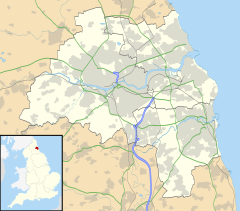Elephant Tea Rooms
| Elephant Tea Rooms | |
|---|---|

The Elephant Tea Rooms
|
|
|
Location within Tyne and Wear
|
|
| General information | |
| Architectural style | Hindu Gothic |
| Address | 65–66 Fawcett Street |
| Town or city | Sunderland |
| Country | United Kingdom |
| Coordinates | 54°54′27″N 1°22′56″W / 54.907434°N 1.382132°W |
| Construction started | 1873 |
| Completed | 1877 |
| Client | Ronald Grimshaw |
| Owner | Royal Bank of Scotland |
| Technical details | |
| Floor count | 3 |
| Design and construction | |
| Architect | Frank Caws |
The Elephant Tea Rooms is a Grade II listed building in Sunderland, Tyne and Wear, England. The building was constructed from 1872 to 1877 by Henry Hopper to a design by architect Frank Caws for Ronald Grimshaw, a local tea merchant, in a blend of the high Victorian Hindu Gothic and Venetian Gothic styles. This was a selling point, as the exotic style and name advertised the exotic origins of the tea sold there.
The exterior is polychrome and was constructed from brick, terracotta and faience. The ground floor has a full-width tiled fascia continuing along to the neighbouring building; this 20th-century alteration may conceal earlier detail. The arcaded first floor has sash windows with sloping sills in the Gothic faience arcade, clasping rings and crocket capitals to the nookshafts, alternate block jambs, raised pointed arches and roll-moulded dripstring. The ogee window heads have fleur-de-lys finials in front of lozenge-patterned terracotta spandrels. The eaves cornice has a corbelled trefoil frieze.
...
Wikipedia

